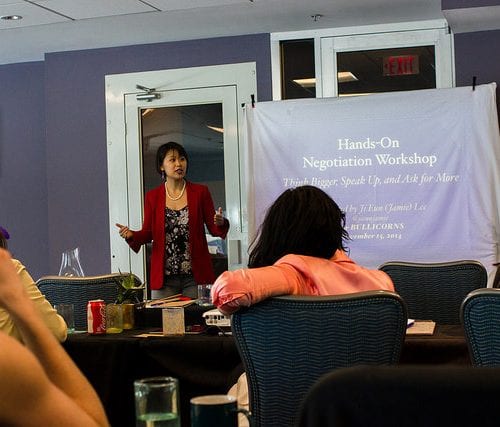This article is more than ten years old. It originally ran on a now-defunct website called TheGloss, where Bullish got its start. This post was created entirely by humans, as AI didn’t exist back then (but also: why would you want to read something no one could be bothered to write?) For more recent posts, try here.
Is it better to rule through love or fear? Machiavelli always gets a bad rap (much like Draco and Procrustes).
In The Prince, however, Machiavelli didn’t actually suggest that ruling through fear was the superior method; he said that a ruling through a combination of love and fear was best, but if you had to pick one, fear is safer.
Of course, none of us are actually ruling a Florentine principality during the Renaissance, but I naturally recalled my tenth grade reading assignment when a fellow committee member for a conference I am planning told me that a few other committee members were scared of me (or, at least, scared of messing up around me). That’s … interesting. I mean, I’m not scary. I’m Ashlee Simpson-sized. I wear a lot of Ann Taylor. I like babies and pets.
I am pretty confident, but I think that’s a skill you can forge, the same way you work towards a degree. I didn’t self-talk my way into being confident. I just worked really hard and became good at my profession and then started making money accordingly, and then I felt pretty decent and mostly moved on to thinking about other things.
Sure, some people are born with ballsiness-from-the-heavens, or just testosterone, or blue-blooded parents who instill in them a sense of patrician entitlement. But I’m suspicious of that kind of “confidence.” I think I’ve met a lot of those people. They have this idea that they’re “a certain kind of person” — the kind who “deserves” to have a doorman and take tropical vacations, for instance, because that’s what “the kind of people they know” have always done — but, when questioned, they have no actual claim to make to these privileges. They stick to their own kind so no one points out that they are merely average people whose parents or grandparents might have had some skills that genetics, sadly, failed to pass on. That’s a shiny-but-hollow Fabergé egg of “confidence.” I’m also suspicious of the kind of “confidence” that requires daily affirmations and a constant influx of motivational literature. Faking it til you make it is better than nothing, but really: that’s acting confident, not being confident.
I think that it doesn’t take much to make a person intimidating in the WASP-y, milquetoast bubble that is most modern workplaces. I wrote in Bullish: Social Class in the Office about blue-collar folks’ propensity for direct speech. That might be it. Here are some things that are considered too blunt to say in a modern office environment: “That is a terrible idea.” “That guy is just annoying.” “If we don’t tackle this problem head-on, we will look like idiots.” “I don’t like working with that person.” “Let’s fucking get this thing done by Monday without holding another fucking meeting.”
Of course, fear is not hate (and Machiavelli had a lot to say about hate — it’s fine to cow people into submission, but if you mess with their women or property, they will take you down). As a child, for instance, I feared (but didn’t hate) my mother, whom I sometimes think of as being about 6’4, although when I actually see her in real life now that I am an adult, she seems rather adorably, huggably person-sized (she’s 5’8). A healthy amount of fear is associated simply with authority and leadership, including the well-earned kind.
I have a little story here. Once, I was part of an all-women comedy tour that traveled up and down the East Coast. Unfortunate circumstances led to one woman’s pulling out, so a male comic was dispatched at the last minute to fill the role. It’s kind of weird to have a man on an all-women’s comedy tour, so he was made the emcee. In the hierarchy of comedy clubs, emcee is actually the lowest job; the emcee warms up the crowd, and then there’s the feature act, and then the headliner closes the show.
In our first show of the tour, the male comic decided the order in which everyone would perform. The order was this: he would open the show, the three women performers would perform, and then he would also close the show. As in, this man appointed himself the headliner. Of an “all-women” comedy tour.
The women performers didn’t really know each other yet, so we didn’t discuss it with each other. But each of us, separately, said something to him about it, in a nudging, indirect sort of way. As in, “Oh, I assume you’re going to switch up the order each night and try some different things. Obviously.” He’d say something noncommittal (“We’ll see”), and then the next night, he’d switch up the order of the women in the middle, but he’d continue to both emcee and appoint himself the star of an all-women comedy show. Even some audience members made comments to the women comics about it. “What on earth is that guy doing?”
I wrote previously in Dealing with Short Men, Tall Men, and Their Various Battles for Dominance about men who cannot pick up on sublimated rage. Such men assume control and wait for a dog-like challenge to their pack dominance. When they don’t get an overt fight — but instead lots and lots of social cues that they are being an asshole — they think that they have “won.” This is like someone stealing your iPod, denying it, and then using your iPod in front of you every day for a year. The passage of time does not cause you to “get over it.” Rather, you become more and more enraged every day.
It is very difficult to rule when you are hated. By the end of the tour, the women had banded together, written a joint letter of complaint to the person who had hired us all, and regularly discussed all important matters in the ladies’ bathroom.
As it turns out, Machiavelli was right on-point about the difference between fear and hate. From The Prince, Chapter 17:
And here comes in the question whether it is better to be loved rather than feared, or feared rather than loved. It might perhaps be answered that we should wish to be both; but since love and fear can hardly exist together, if we must choose between them, it is far safer to be feared than loved…. Nevertheless a Prince should inspire fear in such a fashion that if he does not win love he may escape hate. For a man may very well endure being feared while he is not hated….
There is such a thing as a healthy fear based on respect. I wrote previously in What to Charge for Your Work that I once hired a personal assistant for (at her direct request) more money per hour than the job was advertised for, and that, “while I’ve never been very good at delegating, I put more effort into it and tried to improve, because I respected her time, and also because a woman skilled in both HTML and plumbing is slightly frightening.” Incidentally, this woman was under 25 and less than five feet tall.
A healthily-intimidating skill set is perhaps all the more so when present in a traditionally innocuous-looking package. Additionally, men who are assholes don’t really know what to do about an intimidating person whom it is also socially inappropriate to punch. Virtually all Bullish columns take the form “something that sucks and how to use it to your advantage,” and there it is: another reason that it’s kind of sweet to have a matching set of X chromosomes.









